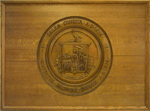Chestnut Street: Difference between revisions
From Salem Links and Lore
No edit summary |
No edit summary |
||
| Line 1: | Line 1: | ||
*First laid out in 1796, it took on its present form from 1800-1840 when most of its houses were built. | *First laid out in 1796, it took on its present form from 1800-1840 when most of its houses were built. | ||
*The street is part of the [[McIntire Historic District]] and the entire street is on the ''National | *The street is part of the [[McIntire Historic District]] and the entire street is on the ''National Register of Historic Places''. | ||
*Two prominent buildings are the Stephen Phillips House (#34) and Hamilton Hall (#9) | *Two prominent buildings are the Stephen Phillips House (#34) and Hamilton Hall (#9). | ||
*The width of the street (80 ft.) was this big so that horse drawn carriages could turn around without difficulty. | *The width of the street (80 ft.) was this big so that horse drawn carriages could turn around without difficulty. | ||
Revision as of 09:31, 18 April 2012
- First laid out in 1796, it took on its present form from 1800-1840 when most of its houses were built.
- The street is part of the McIntire Historic District and the entire street is on the National Register of Historic Places.
- Two prominent buildings are the Stephen Phillips House (#34) and Hamilton Hall (#9).
- The width of the street (80 ft.) was this big so that horse drawn carriages could turn around without difficulty.
- Chestnut Street Days was a popular tradition started in 1926 and repeated 4 more times over a fifty year period. Houses were open to the public, bands were brought in for entertainment and residents dressed in period clothing. Proceeds were earmarked for specific projects for Chestnut Street.
See Also
Chestnut Street Salem Focus Website
Notes on the building of Chestnut Street R. H. Wiswall
Chestnut Street 40 years ago J.D. Phillips
